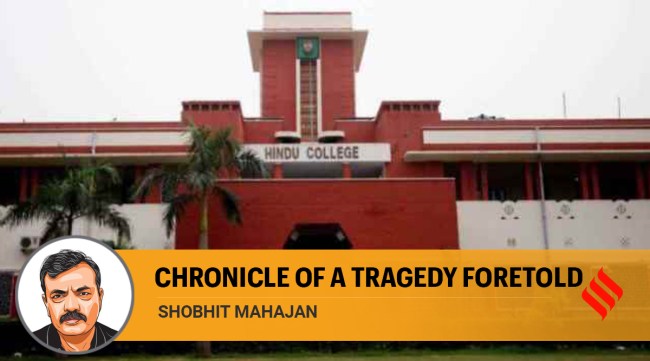Opinion Delhi University ad hoc teacher suicide: Chronicle of a tragedy foretold
Samveer was one of thousands of ad hoc teachers, many of whom have been teaching for years. Systematic exclusions, bias in higher education recruitment has made their future bleak
 The ad hoc lecturer at Hindu College lost his job in February when interviews for permanent positions were being held. (File photo)
The ad hoc lecturer at Hindu College lost his job in February when interviews for permanent positions were being held. (File photo)
“One male identified as Samarveer s/o Satyadev r/o Village Molki, Distt. Bara Rajasthan, age -33 years (unmarried) was found hanging from ceiling fan with a bed sheet.” This was how the press release of Delhi Police reported the tragedy. The matter-of-fact banality of the report, of course, was par for the course.
However, the tragic death of the young man was not simply a statistic — it was a reflection of the deep malaise that pervades our institutions of higher education, in this case, University of Delhi (DU), which is celebrating its centenary this year. The situation in the university is such that a tragedy like this was just waiting to happen.
Samarveer was one of the thousands of young men and women who had been working as ad-hoc lecturers in various DU colleges for years. For various reasons, most of them extra-academic, there had been no permanent appointments in most of the colleges for over a decade or more. And so we had this curious situation of there being more than 5,000 permanent positions that needed to be filled.
Last year, the appointments finally started. Obviously, there were thousands of applicants for the jobs. Unlike the usual practice of shortlisting candidates to be called for the interviews based on their credentials, this time everyone who had more than a certain number of regulation-demanded points in their API score was called. API, for the uninitiated, is the Academic Performance Index — a metric devised by the mandarins in the UGC to be the touchstone of academic merit. The fact that a single metric cannot conceivably capture the total capabilities of a researcher or a teacher is lost on the boffins.
The lower standards meant that every college had to interview hundreds and in some cases thousands of candidates. One college, for instance, had more than 1,500 candidates in physics. This also meant that each candidate was interviewed only perfunctorily, getting only a few minutes with the board. Based on this limited interaction, candidates were selected for the appointment.
What transpired was that in college after college, the ad-hoc teachers who, in some cases had been teaching for more than 15 years, were not selected and were left without a job. This, despite the fact that the college had renewed their contract year after year and thus, it stands to reason, they were found to be competent to teach. If they were not, the college would have replaced them over the years with better and more qualified teachers.
One can argue that jobs should be given based on academic merit and so the interview panel chose the best candidates. Alas, this doesn’t seem to be the case. How else would one explain the selection of a candidate in physics, who is still doing his PhD and worse, has not managed to clear his PhD confirmation despite appearing three times? He was chosen over candidates who not only had PhDs from eminent institutions but also had solid research credentials. There are several such cases that one can cite.
If academic merit was not the determining factor in the appointments, what distinguished the chosen ones from the hundreds of others? Anecdotal evidence, which has been confirmed by at least some of the experts in the interview panels, suggests that the clincher was whether the candidate was “recommended” by certain “social and cultural organisations”.
One can argue that just because someone has been teaching in a contractual position for some time should not automatically guarantee their permanent appointment since that would mean a dilution of academic merit. Nevertheless, a more sympathetic and humane administration could have devised creative ways in which the existing ad-hoc teachers could have been given a leg up. And given the quality of at least some of the appointments, the academic merit bogey is just that.
What is worse for these displaced teachers is that the chances of getting a teaching job in the future are very bleak. The government has decided that the expansion of institutions of higher education is no longer a priority. Instead, students are now encouraged to opt for online courses. The fact that many of the front organisations of ed-tech companies who stand to reap a bonanza are advising the government must be a coincidence. That online teaching can at best supplement classroom interaction, though globally acknowledged, is lost on our policymakers. The interaction with a teacher in a classroom, the peer group interaction which plays a decisive role in not just learning but also in developing the so-called “soft skills” like working in a team, are an integral part of education. A video, no matter how slickly produced, can never replicate that experience.
It is this bleak future that the displaced teachers face, possibly led Samarveer to take the extreme step. Unfortunately, his death will soon be forgotten and it will be business as usual without any assessment of institutional failure and even culpability.
Just a day after this tragedy, I noticed a serpentine line of students waiting to enter the very college where Samarveer had taught for over five years. It turned out that the college was having its annual cultural festival. The irony of this temporal juxtaposition was presumably lost on the college authorities. Or maybe it is a sign of times when if you cannot provide a good education, at least provide a good circus.
The writer is professor of physics and astrophysics, University of Delhi





